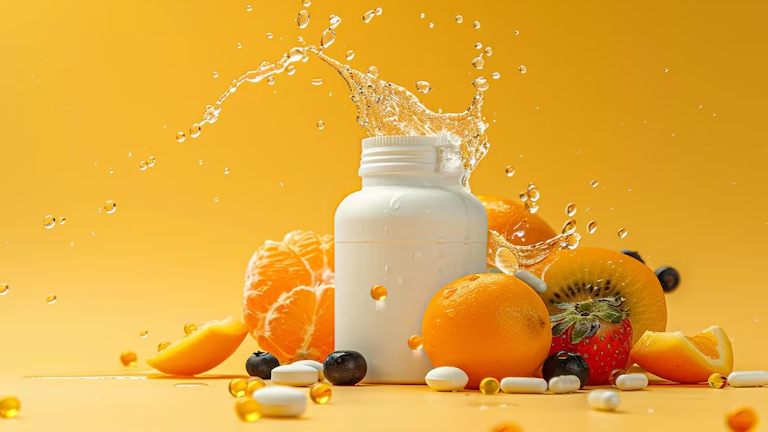When it comes to fitness and muscle growth, diet and exercise are crucial—but so are the right vitamins and supplements. Proper nutrition fuels muscle repair, enhances performance, and speeds up recovery. While whole foods should always be your primary source of nutrients, certain vitamins for fitness can give you an extra edge in the gym.
In this guide, we’ll explore the best vitamins for fitness and muscle growth, backed by science. We’ll also cover dosage recommendations, natural food sources, and whether supplements are necessary.
1. Vitamin D – The Muscle Builder (Vitamins For Fitness)
Why It’s Essential for Athletes
Vitamin D plays a key role in muscle function and strength. Studies show that athletes with optimal vitamin D levels have better muscle recovery and performance. It helps with calcium absorption, which is vital for muscle contractions.
Dosage & Sources
-
Recommended Daily Intake: 600–800 IU (higher for deficiencies)
-
Food Sources: Fatty fish (salmon, mackerel), fortified dairy, egg yolks
-
Supplementation: Consider vitamin D3 (cholecalciferol) if sunlight exposure is limited.
2. B Vitamins – Energy Boosters (Vitamins For Fitness)
Why They’re Essential for Athletes
B vitamins (B1, B2, B3, B6, B12) help convert food into energy, making them crucial for workout performance and endurance. They also support red blood cell production, which improves oxygen delivery to muscles.
Dosage & Sources
-
Recommended Daily Intake: Varies (B12: 2.4 mcg, B6: 1.3–1.7 mg)
-
Food Sources: Whole grains, lean meats, eggs, leafy greens
-
Supplementation: A B-complex supplement can help if diet is insufficient.
3. Magnesium – The Recovery Mineral (Vitamins For Fitness)
Why It’s Essential for Athletes
Magnesium aids in muscle relaxation, protein synthesis, and reducing cramps. It also helps regulate electrolytes, preventing fatigue during intense workouts.
Dosage & Sources
-
Recommended Daily Intake: 310–420 mg
-
Food Sources: Nuts, seeds, spinach, dark chocolate
-
Supplementation: Magnesium citrate or glycinate for better absorption.
4. Omega-3 Fatty Acids – Anti-Inflammatory Powerhouse (Vitamins For Fitness)
Why They’re Essential for Athletes
Omega-3s reduce muscle inflammation and soreness, speeding up recovery. They also support joint health, which is crucial for weightlifters and endurance athletes.
Dosage & Sources
-
Recommended Daily Intake: 250–2000 mg of EPA/DHA
-
Food Sources: Fatty fish, flaxseeds, walnuts
-
Supplementation: Fish oil or algae-based omega-3 supplements.
5. Vitamin C – The Immunity & Collagen Booster
Why It’s Essential for Athletes (Vitamins For Fitness)
Vitamin C supports collagen production (key for tendons and ligaments) and acts as an antioxidant, reducing oxidative stress from intense training.
Dosage & Sources
-
Recommended Daily Intake: 75–90 mg (higher for athletes)
-
Food Sources: Citrus fruits, bell peppers, strawberries
-
Supplementation: Only needed if dietary intake is low.
6. Zinc – The Testosterone Supporter (Vitamins For Fitness)
Why It’s Essential for Athletes
Zinc boosts testosterone levels, which is vital for muscle growth. It also aids in protein synthesis and immune function.
Dosage & Sources
-
Recommended Daily Intake: 8–11 mg
-
Food Sources: Oysters, beef, pumpkin seeds
-
Supplementation: Zinc picolinate or citrate if deficient.
7. Iron – Oxygen Transport for Endurance (Vitamins For Fitness)
Why It’s Essential for Athletes
Iron is critical for oxygen delivery to muscles. Deficiency can lead to fatigue and poor performance, especially in endurance athletes.
Dosage & Sources
-
Recommended Daily Intake: 8–18 mg (higher for women)
-
Food Sources: Red meat, spinach, lentils
-
Supplementation: Only if blood tests confirm deficiency.
8. Creatine – The Strength & Power Enhancer
Why It’s Essential for Athletes (Vitamins For Fitness)
Creatine is one of the most researched supplements for increasing strength, power, and muscle mass. It helps regenerate ATP, the primary energy source for short, explosive movements.
Dosage & Sources
-
Recommended Daily Intake: 3–5 g daily
-
Food Sources: Red meat, fish
-
Supplementation: Creatine monohydrate is the gold standard.
9. Whey Protein – The Muscle Repair Supplement
Why It’s Essential for Athletes (Vitamins For Fitness)
Whey protein provides fast-absorbing amino acids, crucial for muscle repair and growth post-workout.
Dosage & Sources
-
Recommended Daily Intake: 20–40 g per serving
-
Food Sources: Dairy products
-
Supplementation: Ideal for post-workout recovery.
10. Glutamine – The Recovery Amino Acid (Vitamins For Fitness)
Why It’s Essential for Athletes (Vitamins For Fitness)
Glutamine helps reduce muscle breakdown and supports immune function, especially during intense training phases.
Dosage & Sources
-
Recommended Daily Intake: 5–10 g post-workout
-
Food Sources: Meat, eggs, dairy
-
Supplementation: Useful for heavy training periods.
Best Vitamins & Supplements for Muscle Growth
| Supplement | Key Benefits | Recommended Dosage | Best Food Sources |
|---|---|---|---|
| Vitamin D | Enhances muscle strength & recovery | 600–800 IU/day | Fatty fish, fortified dairy, eggs |
| B Vitamins | Boosts energy & endurance | Varies (B12: 2.4 mcg/day) | Whole grains, lean meats, eggs |
| Magnesium | Reduces cramps & supports protein synthesis | 310–420 mg/day | Nuts, spinach, dark chocolate |
| Omega-3s | Reduces inflammation & speeds recovery | 250–2000 mg EPA/DHA/day | Fatty fish, flaxseeds, walnuts |
| Vitamin C | Supports collagen & reduces oxidative stress | 75–90 mg/day (more for athletes) | Citrus fruits, bell peppers |
| Zinc | Boosts testosterone & muscle repair | 8–11 mg/day | Oysters, beef, pumpkin seeds |
| Iron | Improves oxygen delivery to muscles | 8–18 mg/day (higher for women) | Red meat, spinach, lentils |
| Creatine | Increases strength & power output | 3–5 g/day | Red meat, fish (or supplements) |
| Whey Protein | Fast muscle recovery & growth | 20–40 g post-workout | Dairy products (or supplements) |
| Glutamine | Prevents muscle breakdown & aids recovery | 5–10 g post-workout | Meat, eggs, dairy (or supplements) |
Key Notes:
✅ Whole foods first – Supplements should fill gaps, not replace meals.
✅ Consult a doctor before starting high-dose supplements (e.g., iron, vitamin D).
✅ Timing matters – Some (like whey & creatine) work best post-workout.
This table provides a quick reference for fitness enthusiasts looking to optimize muscle growth and recovery. Would you like any modifications or additional details? 💪
Why Vitamins Are Important for Fitness
Vitamins play a critical role in fitness, affecting energy levels, muscle growth, recovery, and overall performance. Whether you’re an athlete, bodybuilder, or casual gym-goer, proper vitamin intake can make a significant difference in your results.
Here’s why vitamins are essential for fitness:
1. Energy Production & Metabolism
-
B Vitamins (B1, B2, B3, B6, B12) help convert food into energy.
-
Vitamin B12 supports red blood cell production, improving oxygen delivery to muscles.
-
Deficiency leads to fatigue, poor endurance, and slower recovery.
2. Muscle Growth & Repair
-
Vitamin D enhances muscle protein synthesis and strength.
-
Vitamin C aids collagen production, supporting tendons and ligaments.
-
Vitamin E reduces oxidative stress, speeding up recovery.
3. Immune System Support
-
Intense workouts weaken immunity (especially endurance athletes).
-
Vitamin C, D, and Zinc help prevent illness and keep you training consistently.
4. Bone Strength & Injury Prevention
-
Vitamin D & K2 improve calcium absorption for stronger bones.
-
Magnesium & Vitamin C support joint health, reducing injury risk.
5. Reducing Inflammation & Oxidative Stress
-
Antioxidant vitamins (C, E, A) combat exercise-induced free radicals.
-
Omega-3s (not a vitamin but crucial) reduce muscle soreness.
6. Hormonal Balance
-
Vitamin D regulates testosterone levels (critical for muscle growth).
-
Magnesium & B6 support cortisol (stress hormone) regulation.
Best Food Sources vs. Supplements
| Vitamin | Best Food Sources | Recommended Supplement? |
|---|---|---|
| Vitamin D | Fatty fish, eggs, sunlight | Often needed (especially in winter) |
| B Vitamins | Whole grains, meat, eggs | Only if deficient (vegans may need B12) |
| Vitamin C | Citrus fruits, bell peppers | Rarely needed if diet is good |
| Vitamin E | Nuts, seeds, spinach | Usually not necessary |
What Happens If You’re Deficient?
-
Low energy & endurance
-
Slow muscle recovery
-
Weak immune system (frequent colds)
-
Higher injury risk
Final Verdict: Should You Take Vitamins for Fitness?
✔ Yes, if:
-
You train intensely (athletes, bodybuilders).
-
You have dietary gaps (vegan, low sunlight exposure).
-
Blood tests show deficiencies.
❌ No, if:
-
You eat a balanced diet with whole foods.
-
You already get enough from sunlight (for Vitamin D).
Best Approach: Get most vitamins from whole foods, supplement only when necessary, and consider a blood test to check levels.
Final Thoughts: Do Vitamins Help with Exercise Performance? (Vitamins For Fitness)
The right vitamins for fitness can significantly enhance muscle growth, recovery, and performance. While whole foods should always be the priority, supplements can fill nutritional gaps—especially for athletes with higher demands.
Key Takeaways:
✔ Vitamin D & Magnesium support muscle function and recovery.
✔ B Vitamins & Iron boost energy and endurance.
✔ Omega-3s & Vitamin C reduce inflammation and aid repair.
✔ Creatine & Whey Protein are proven for strength and muscle gains.
For best results, combine these essential vitamins for athletes with a balanced diet and consistent training. Always consult a healthcare provider before starting new supplements.
FAQ: Best Vitamins for Fitness
Q: What is the most important vitamin for muscle growth?
A: Vitamin D is crucial for muscle function, while B vitamins support energy metabolism.
Q: Can vitamins replace a good diet for fitness?
A: No—supplements should complement, not replace, a nutrient-rich diet.
Q: How do I know if I need supplements?
A: Blood tests can identify deficiencies. Otherwise, focus on whole foods first.
By optimizing your intake of these top vitamins for workout recovery, you’ll maximize gains and performance in the gym!


